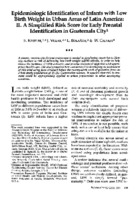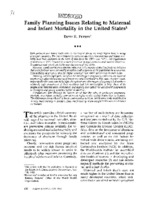Epidemiologic identification of infants with low birth weight in urban areas of Latin America:: II A simplified risk score for early prenatal
| dc.contributor.author | Kestler, E | es_ES |
| dc.contributor.author | Villar, José | es_ES |
| dc.contributor.author | Bolaños, L | es_ES |
| dc.contributor.author | Calvert, W | es_ES |
| dc.date.accessioned | 2016 | |
| dc.date.available | 2016 | |
| dc.date.issued | 1991 | es_ES |
| dc.identifier.uri | https://iris.paho.org/handle/10665.2/27095 | |
| dc.description.abstract | A simple, empirically derived instrument is needed in developing countries to identify mothers at risk of delivering low birth weight (LBW) infants, in order to help reduce the incidence of LBW deliveries and provide mothers at high risk with appropriate health care. The study reported here was devoted to developing an instrument of this kind using data obtained before the twenty-sixth week of gestation from an urban study population of 17,135 Guatemalan women. It appears that this instrument could be appropriately applied to urban populations in other developing countries | en_US |
| dc.format.extent | graf | es_ES |
| dc.relation.ispartofseries | Bulletin of the Pan American Health Organization (PAHO);25(2),1991 | en_US |
| dc.subject | Infant, Low Birth Weight | es_ES |
| dc.subject | Prenatal Care | es_ES |
| dc.subject | Socioeconomic Factors | es_ES |
| dc.subject | Developing Countries | es_ES |
| dc.subject | Urban Population | es_ES |
| dc.subject | Risk Factors | es_ES |
| dc.subject | Guatemala | es_ES |
| dc.subject | Latin America | es_ES |
| dc.title | Epidemiologic identification of infants with low birth weight in urban areas of Latin America:: II A simplified risk score for early prenatal | en_US |
| dc.type | Journal articles | en_US |
| dc.rights.holder | Pan American Health Organization | en_US |
Files in this item
This item appears in the following Collection(s)
-
Pan American Journal of Public Health
Revista Panamericana de Salud Pública




